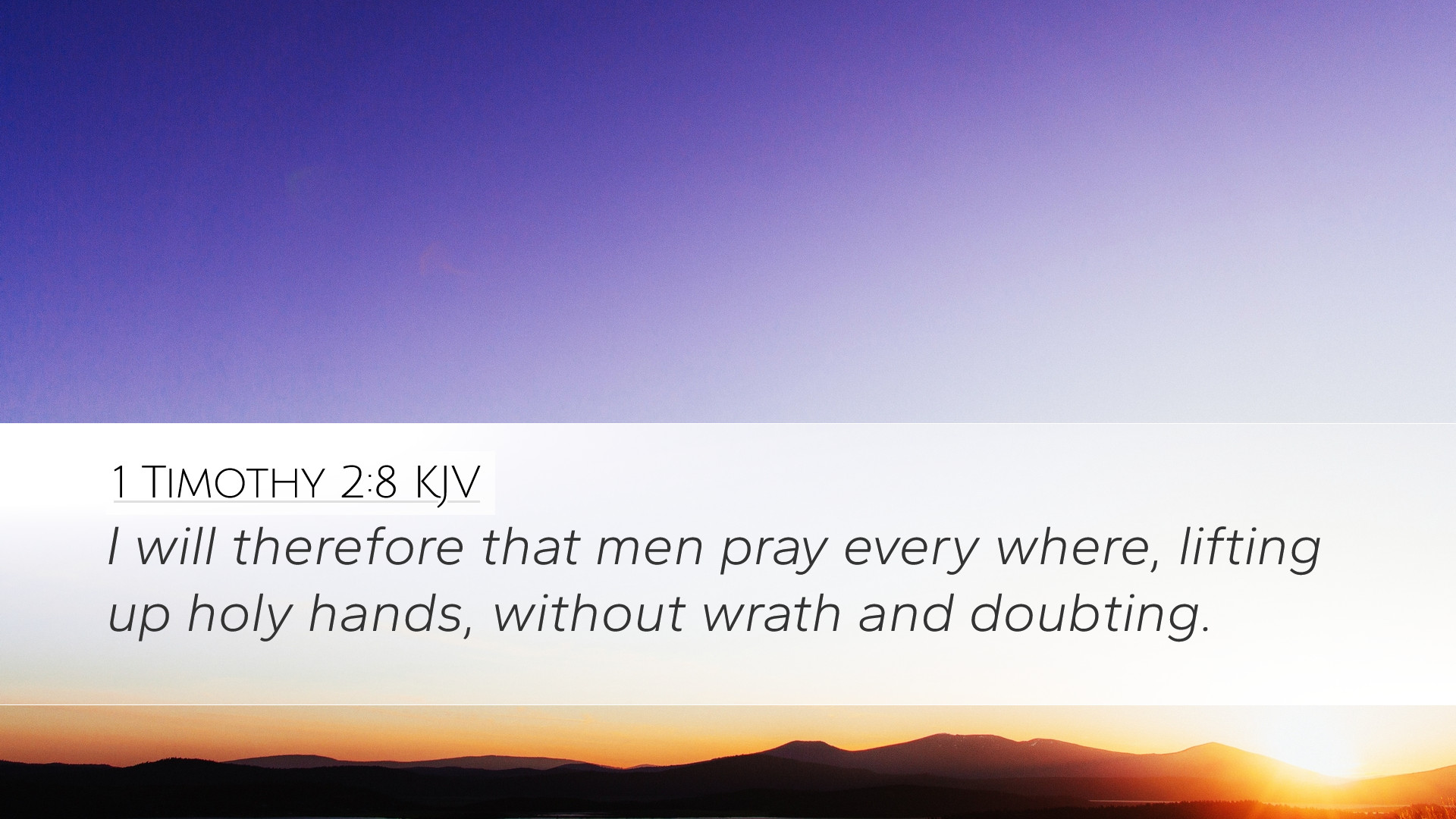Old Testament
Genesis Exodus Leviticus Numbers Deuteronomy Joshua Judges Ruth 1 Samuel 2 Samuel 1 Kings 2 Kings 1 Chronicles 2 Chronicles Ezra Nehemiah Esther Job Psalms Proverbs Ecclesiastes Song of Solomon Isaiah Jeremiah Lamentations Ezekiel Daniel Hosea Joel Amos Obadiah Jonah Micah Nahum Habakkuk Zephaniah Haggai Zechariah Malachi1 Timothy 2:8
1 Timothy 2:8 KJV
I will therefore that men pray every where, lifting up holy hands, without wrath and doubting.
1 Timothy 2:8 Bible Commentary
Commentary on 1 Timothy 2:8
Verse: 1 Timothy 2:8 - "I desire then that in every place the men should pray, lifting holy hands without anger or quarreling."
Introduction
The apostle Paul’s instruction in 1 Timothy 2:8 serves as a vital component of his broader discourse on order and propriety within the church. This verse emphasizes the importance of prayer and the attitudes that are crucial for a genuine prayer life. By drawing insights from renowned public domain commentaries, we see a multi-faceted approach to understanding this verse.
Exegesis and Context
Contextual Background: Paul wrote this epistle to Timothy, who was overseeing the church in Ephesus. At this time, the early church faced various challenges, including disputes and distractions that threatened its unity and mission. In chapter 2, Paul addresses the need for corporate prayer and outlines the character and conduct that should accompany it.
Commentary Insights
- Matthew Henry: Henry emphasizes that the posture of prayer signifies the purity and sincerity of one's approach to God. He notes that 'lifting holy hands' is both a physical and spiritual posture, signifying a heart free from malice and wrong intentions. The act of raising hands in prayer is a biblical symbol of surrender and devotion.
- Albert Barnes: Barnes expands on Paul’s insistence that men pray 'without anger or quarreling.' He interprets this as a call to maintain peace and harmony within the community. The emphasis here is on the relational aspect of prayer; one must not be harboring unresolved conflicts or ill-will toward others while approaching God.
- Adam Clarke: Clarke provides insight into the term 'every place,' suggesting that Paul promotes an attitude of prayer that transcends specific locations. He indicates that prayer should be a continuous, universal practice for believers. Clarke also emphasizes the importance of a clean heart as a prerequisite for heartfelt prayer.
Theological Implications
This verse holds rich theological significance for understanding the nature of prayer and its place within worship. It teaches that:
- The Holiness of God: God’s holiness demands that those who approach Him do so with absolute reverence and moral integrity.
- Community and Unity: The call to pray without anger signifies the necessity of community cohesion where relational conflicts are resolved, fostering an environment conducive to worship.
- Physical and Spiritual Integrity: Praying with lifted hands illustrates a holistic approach to worship, engaging both body and spirit in communication with God.
Practical Applications
For pastors, students, theologians, and scholars, several practical applications can be drawn from this verse:
- Encouragement of Praying Together: Pastors should encourage communal prayer gatherings, emphasizing that unity in prayer can strengthen the church’s witness and effectiveness.
- Personal Reflection: Individuals should regularly examine their hearts and relationships to ensure they approach God sincerely, without harboring anger or unresolved conflicts.
- Teaching on Posture in Worship: Consider sermons and studies on the significance of physical expressions in prayer, highlighting their biblical roots and spiritual meanings.
Conclusion
1 Timothy 2:8 encapsulates essential principles regarding prayer in the life of the church. As noted by Henry, Barnes, and Clarke, understanding the context and proper disposition for prayer can significantly impact the believer's spiritual life and communal worship experience. Thus, it calls for a reflective and intentional approach to speaking with God, ensuring that our prayers flow from hearts dedicated to peace, holiness, and unity.


